RBI has wide supervisory powers over financial institutions, its directions are statutorily binding: Supreme Court

The Supreme Court has remarked that the Reserve Bank of India (RBI) has wide supervisory powers over financial institutions like SIDBI, in furtherance of which, any direction issued by the RBI, deriving power from the RBI Act or the Banking Regulation Act is statutorily binding on these financial institutions.
An appeal was filed by SIDBI against a judgment of the Division Bench of the Calcutta High Court, whereby the decision of the Single Judge dismissing the suit of M/s. SIBCO Investment Pvt Ltd (SIBCO) was reversed.
The said suit was filed against Small Industries Development Bank of India (SIDBI) seeking interest on the alleged belated payment of principal sum and accrued interest to the plaintiff for the Bonds issued by SIDBI.
Factual Matrix: 41 Bonds were initially issued by SIDBI to M/s. CRB Capital Markets Ltd. (“CRB Capital”) in 1993. Those Bonds were then sold by CRB Capital to one Shankar Lal Saraf in February, 1997 and those in turn were then sold on July 1, 1998 to SIBCO – the respondent. In the meantime, CRB Capital faced winding up proceedings at the instance of the RBI in the Delhi High Court.
SIDCO claimed payment on the bonds but SIDBI refused to do so citing CRB Capital's involuntary liquidation at the behest of RBI. SIDCO then approached the company court and also requested Shankar Lal Saraf to file an interlocutory application in the company court claiming that the bond payment transaction be treated as outside the purview of liquidation proceedings under the Companies Act, 1956. Company Court then adjudged that the subject Bonds were beyond the purview of liquidation proceedings, following which appellant made the payment of principal amount together with interest.
Later, SIDCO detected a delayed payment of interest and demanded the same. SIDBI refused to do so citing that RBI had issued a facsimile directing it not to affect any transfer or otherwise deal with any security invested by CRB Capital and its group Companies without prior permission of the official liquidator appointed by the Company Court at Delhi.
Aggrieved by this, a civil suit was filed claiming delayed redemption of aforesaid bonds. The trial court treated RBI's order as a directive and noted that there was a clear stipulation against affecting any transfer without the permission of official liquidator and dismissed the suit, but the Calcutta High Court reversed the order and directed the SIDBI to pay interest amount from the date of accrual on the bonds.
A bench of Justices R Subhash Reddy and Hrishikesh Roy noted that admittedly, the RBI had issued a Notification dated April 10, 1997, deriving power from S. 45-MB(2) of the RBI Act and had frozen the assets of CRB Capital on the grounds of public policy, for the purpose of protecting interests of creditors and depositors of CRB Capital.
"The RBI did not cite any provision in its Direction dated 09.06.1997 to the defendant, as it was not under any compulsion to do so. It was sufficient that the RBI’s power to issue such a direction could be traced to either S.45-MB(2) of the RBI Act, or S. 35-A of the Banking Regulation Act. Hence, the said direction was statutorily binding on the defendant....", added the Court.
It was further found that in reference to the Directive dated June 9, 1997, whereby RBI had restrained SIDBI from parting with any money in relation to securities held by CRB, SIDBI proactively sought advice from the Official Liquidator in regards to the payment of interest income to the defendant.
"But, in absence of the Official Liquidator’s consent and guidance, the defendant could not have made the payment without inviting onerous consequences for itself. Hence, it can be said that the defendant acted prudently, being conscious of the legal obligation, to withhold such payment to the plaintiff.", noted the bench.
The Court added that when SIBCO approached the Writ Court to validate their transaction, they failed to put forth any claim for interest on delayed payment.
"Curiously, the plaintiff chose not to approach the Company Court directly and instead relied upon Shankar Lal Saraf to secure a favourable verdict on the issue. They even chose to forgo the very first opportunity that arose for claiming interest on delayed payment, when the defendant was remitting the amount due to the plaintiff while complying with the Company Court verdict. Pertinently the payment was accepted without protest and only after about 7 months, additional sums were demanded on the Bonds", it remarked.
Thus, while allowing SIDBI's appeal, the court said,
"Additional sum in our estimation is not merited as SIBCO has already received their just entitlement and burdening the defendant with any further amount towards 18 Act 3 Scene 3 – The Merchant of Venice interest would be akin to Shylockian extraction of blood from the defendant."
Cause Title: SMALL INDUSTRIES DEVELOPMENT BANK OF INDIA v M/S. SIBCO INVESTMENT PVT. LTD.
